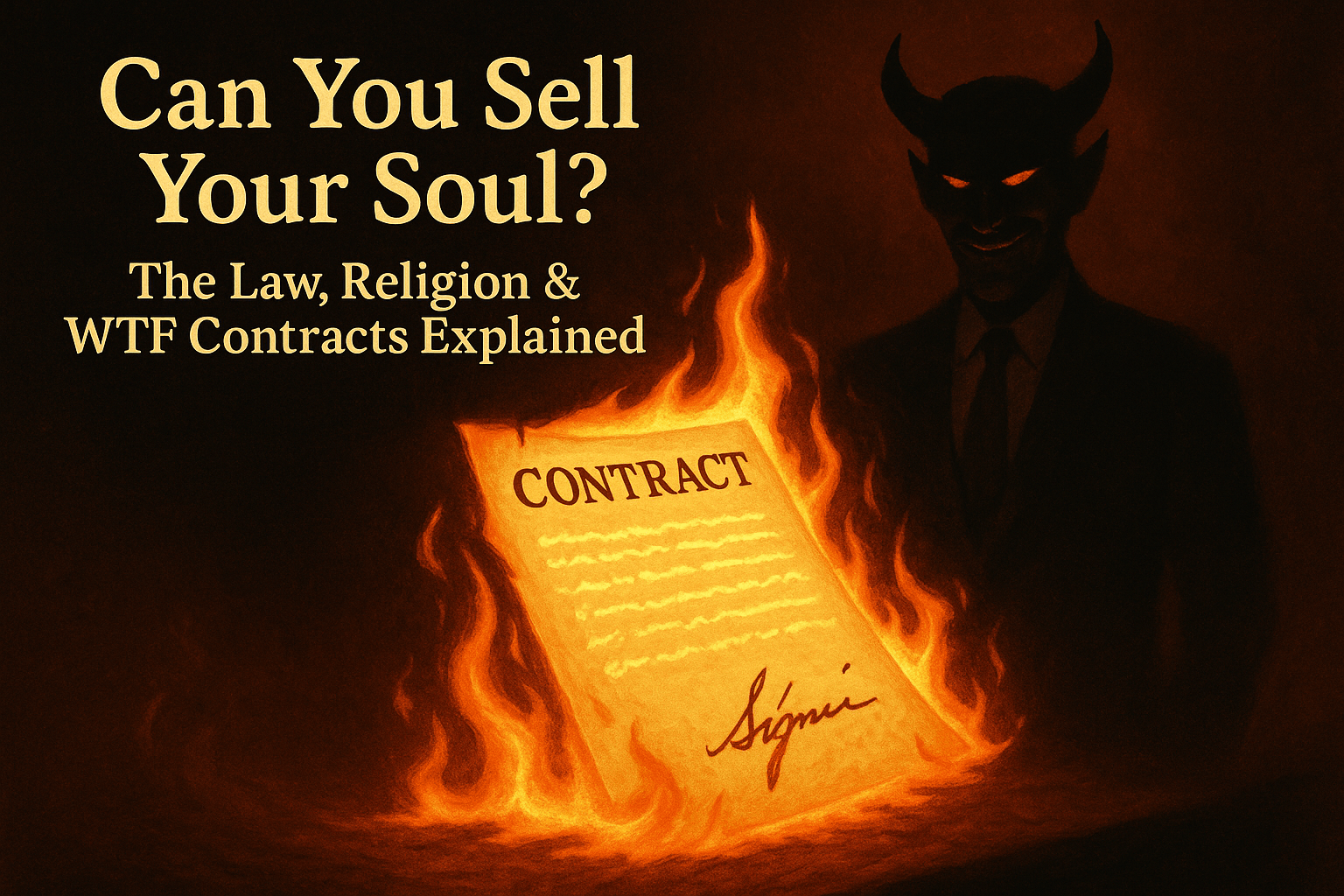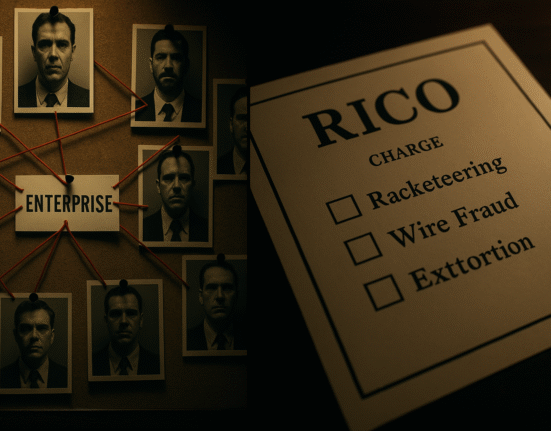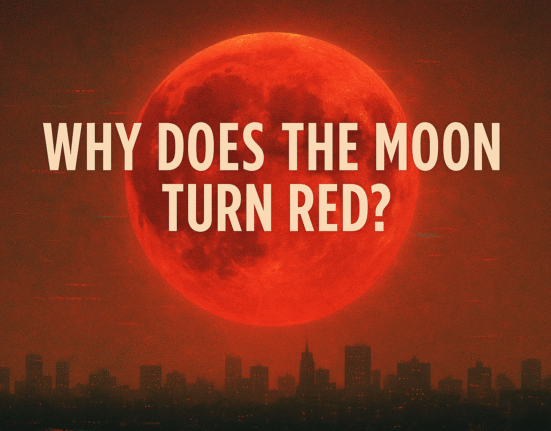People joke about “selling their soul to the devil” for fame, love, or a PS5 restock. But what if you actually wrote it down, signed a contract, and tried to enforce it?
Would a court care? Or would a judge just laugh and say: “Nice try, Lucifer.”
📜 The Origins of Soul-Selling
The idea of trading your soul for gain is ancient:
- Faust legend (Germany, 1500s): A scholar makes a deal with Mephistopheles — ultimate knowledge in exchange for his soul. This story set the template.
- Crossroads myth (American blues): Musician Robert Johnson allegedly met the devil at midnight, trading his soul for guitar skills that defined modern blues.
- Witch trials: In medieval Europe, thousands were accused of making “pacts with the devil.” Historians note that fear of soul-selling was so strong it fueled centuries of persecution.
The meme is old. But what about real life?
🛒 The eBay Soul Market

At one point, people literally tried selling their souls online.
- 2000s: Dozens of users listed their “souls” on eBay. Prices went from a few bucks to hundreds of dollars.
- Policy ban: eBay eventually stepped in, banning “intangible items” like souls, ghosts, or friendship. The official rule: “Items must be tangible and transferable.”
Translation: you can’t ship your soul in a box, so it’s off-limits.
🖊️ When Companies Claimed Souls (As a Joke)

- In 2010, UK-based Game Station slipped a clause into their online service agreement: customers agreed to give the company their souls. Thousands “sold” them without noticing. The clause was later voided, but it proved nobody reads terms & conditions.
- Other companies copied the gag — some apps jokingly claimed souls or first-born children just to see if people noticed. Spoiler: they didn’t.
⚖️ Can Courts Enforce a Soul Contract?
Short answer: Nope.
Here’s why:
- A valid contract needs offer, acceptance, consideration, and subject matter.
- Souls don’t qualify because they can’t be defined, measured, or delivered.
- Courts reject contracts involving “impossible or illegal subject matter.”
So if you sue the devil for breach of contract, the judge will dismiss your case faster than you can say exorcism.
⛪ Religion vs. Law
- Christianity: Selling your soul is the ultimate betrayal — but theologically, only God decides ownership. (Matthew 16:26: “What good is it for someone to gain the whole world, yet forfeit their soul?”)
- Islam: While the Qur’an doesn’t mention “soul selling,” it warns against trading faith for worldly gains. (Qur’an 2:86).
- Hinduism: The atman (soul) is eternal and untouchable. No transaction possible.
- Buddhism: There’s no permanent soul at all — so “soul selling” makes no sense.
- Law: Courts don’t recognize souls as property.
So in religion = deadly serious.
In law = laughably void.
👀 Real Case Studies
- UK student, 2000: Tried selling his soul on eBay. Bidding reached £400 before it was removed.
- New Zealand, 2013: Another “soul auction” was banned by eBay. Listing description: “slightly used soul, comes with bad habits.”
- Performance art: U.S. artist Jonathon Keats “sold” his soul for $10 in 2001 as an art piece. Buyers got certificates of ownership. Museums now display these.
- TikTok, 2021: A viral video showed a user drafting and burning a fake “soul contract.” Millions watched — mostly for laughs.
None of these cases had legal teeth, but they prove people keep trying.
🧠 Psychology of Soul-Selling
Why do people keep making this deal, even as a joke?
- Symbol of desperation: Trading eternal value for short-term gain.
- Rebellion meme: A way to mock authority (religion, parents, society).
- Dark humor flex: Proof that taboo ideas still fascinate.
Psychologists call this a Faustian bargain — giving up integrity for reward. In politics, business, and celebrity culture, it’s still the go-to metaphor for bad deals.
🎬 Pop Culture Obsession
- The Simpsons (Bart sells his soul for $5).
- South Park (Kenny signs his soul away repeatedly).
- Tenacious D in The Pick of Destiny (rock battle with Satan).
- Supernatural (soul deals as a recurring plot).
- Video games (Diablo, Dark Souls) literally gamify soul trading.
It’s the cultural shorthand for: “ultimate bad deal.”
🧾 Legal Deep Dive: What Lawyers Say
- Contract law experts explain that any agreement must have “capacity to perform.” Selling something unprovable (like a soul) = void.
- Courts often laugh off “contracts in jest.” If both parties know it’s a joke, there’s no enforceable deal.
- Even if you pretended it was real, you’d hit the “public policy” clause: courts don’t enforce morally absurd contracts.
So the Devil could drag you to hell… but he’s not winning a case in court.
❓ Expanded FAQ
Can you sell your soul for money?
Legally no. Religiously yes (symbolically).
Why did eBay ban soul sales?
Because souls are “intangible items” — and it turned into chaos.
Has anyone tried in court?
No serious case has made it to trial. Any lawsuit would be dismissed.
Why do people say ‘corporates sell their soul’?
It’s a metaphor for sacrificing values for money.
Could an AI or NFT represent a soul contract?
Lawyers say even digital “soul tokens” would be void — still no measurable subject.
What happens if you ‘sign a contract’ with the devil?
Theology: you’re doomed. Law: paper shredder time.
💡 Final Bruh Take
Turns out, you can sell your car, your PS5, even grandma’s vinyl collection…
But your soul? Worth less than Monopoly money in court.
The Devil might keep the deal.
But PayPal definitely won’t.
”
📚 Sources / References
- Intangible items policy – eBay
- “Nobody reads terms and conditions: it’s official” – Pinsent Masons
- “7,500 Online Shoppers Unknowingly Sold Their Souls” – Fox News










Leave feedback about this